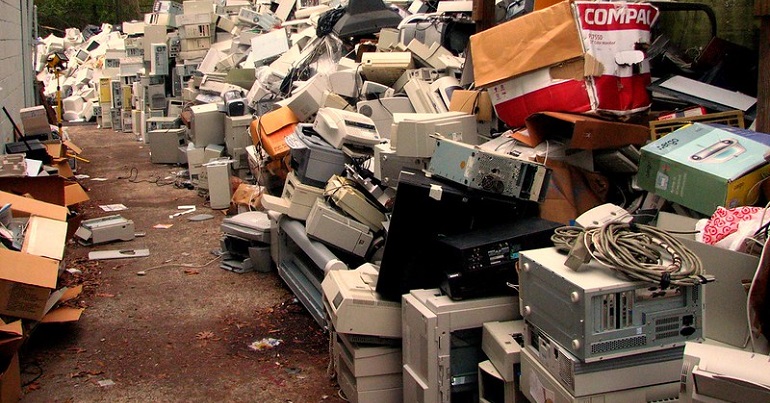COVID-19 and the problem of electronic waste

The global demand for electronics has gone up in response to increased numbers of people homeworking. But in the UK it’s been noted that collection volumes of waste electrical and electronic equipment have significantly dropped. The closure of household recycling centres and businesses is thought to be the cause. This trend has been seen globally, and has caused issues for electronics manufacturers hoping to include a higher percentage of recycled metals in their products. Similarly, the crash in oil prices has meant that recycling the plastic elements of e-scrap is in many cases no longer economical. In the longer-term, however, e-waste volume is predicted to increase as a result of COVID-19. Given that pre-pandemic levels of e-waste were roughly equivalent to 1,000 laptops being thrown away every second, this is alarming news.
E-Waste processors as essential workers
For the most part, those who recycle e-waste for a living have been regarded as essential workers during the pandemic – at least in high-income countries. Household Recycling Centres across the UK shut for around 2 months whilst the virus was at its peak, but most are now operating again with social distancing measures in place. These sites are often not where the electronics are actually recycled though. They are a collection point only. Extensive legislation, including United Nations treaties such as the Basel Convention, exist to prevent the export of hazardous waste material (including electronic waste) over national borders, but despite this an estimated 40% of e-waste generated in the U.S., Canada, and Europe is exported to Asia.
Approximately 50 million tonnes of electronic waste is produced each year – most of which is either incinerated or dumped in the landfills of the world’s poorest communities. The electronics recycling industry in places like Malaysia and Thailand is largely informal and has little to no accountability or transparency, many e-waste processors work from home with no protective equipment. Copper and gold are both found in waste electrical devices, so it is small wonder e-waste processors will want to recover these valuable metals and sell them for a small profit. However, this work is dangerous, exposing workers to a host of other chemicals inside electronics. Unsafe recycling techniques, such as burning plastic cables, expose both adult and child workers as well as their families to a range of hazardous substances through the inhalation of toxic fumes. Lead, cadmium, chromium, brominated flame retardants and polychlorinated biphenyls (PCBs) are all found within electronics, and are all harmful to humans. E-waste processors who have developed respiratory conditions due to their work environment will now be at an even greater risk from COVID-19. These activities also pollute the environment, with chemicals accumulating in soil, water and food.
Due to the informal and often illegal nature of this work, very little is known about how the pandemic has impacted on e-waste processors in the Global South.
Technology and solidarity
The introduction of “lockdown” measures in many countries has also led to a proliferation in initiatives aiming to connect those in most need with the electronic devices that have become so essential for work, learning and accessing services. Schemes like the Umbrella Lane sex work support project, who are encouraging their supporters to donate unwanted smartphones which will then be distributed to sex workers allowing them to work safely at this time.
Sex workers aren’t the only group calling for solidarity through the donation of technology, another example being a recent crowdfunder that has so far raised over £3.5k to buy laptops for Black UK activists. Access to technology is increasingly important, and those existing on the margins of society are more likely to experience digital poverty. Therefore, extending the life of electronic devices and making repair services more affordable is not just an environmental issue but a social one.
Right to repair and social distancing
The “Right To Repair” campaign is a movement of people across Europe who are calling for the right to repair their electronic devices – which is currently prohibitively expensive, requires specialist tools and often is not even permitted due to copyright law. The pandemic has made people value community-sufficiency, it has thrown our global supply chains into the spotlight and highlighted how fragile, exploitative and wasteful said supply chains really are. Nothing embodies this misuse of corporate power more than the case of Henrik Huseby, an iPhone repair man from Norway. After the Norweigian Supreme Court found him guilty of violating trademark (repairing iPhone screens) on 5th June, Huseby was left with severe financial consequences including a €23,000 payment to Apple and his own legal fees. In the midst of a pandemic multinational corporations such as Apple are still ruthlessly focused on profit whilst the rest of us are working to get ourselves and our communities through this tough time. Intellectual property is being used as a “weapon” when what we really need is collaboration.
When tech-companies design electronic devices to become obsolete within a few years, and also make it intentionally difficult to repair and refurbish those devices to maximise their own profit, they are depriving society. They are depriving us of jobs – imagine how many small businesses could flourish in the repair economy if they were empowered to do so rather than being sued for daring to even try. It is estimated that reusing or recycling computers can create 296 more jobs per year for every 10,000 tons of computer waste processed than disposal. These tech companies are depriving us of a livable future on this planet – the environmental impacts of e-waste are huge, polluting habitats and communities, often in the Global South. They are depriving us of our hard-earned cash – products that only last a few years simply are not good value for money, we deserve better, and so do our schools and workplaces.
Nowadays, uncertainty is our reality, and designing electronic devices to last and be repairable rather than designing them to break just after they come out of warranty would be a step towards a just and green recovery from the COVID-19 pandemic – and even the tech giants are reconsidering their position, it would seem. One thing is clear, though: we can’t recycle our way out of the issues created by unsustainable, unethical and untransparent electronics supply-chains. These issues affect millions of people globally, as well as their communities and the natural world, too. We need accountability and supply-chain justice, and if big-tech companies won’t be part of the solution then they are part of the problem.
Electronics Watch is a worker-driven monitoring organisation focusing on the electronics industry – they’ve been supporting electronics workers throughout the COVID-19 pandemic to organise for their rights under difficult circumstances. Sweatshop Free is part of a movement of people across the world who are coming together to win workers’ rights for electronics workers. Our campaign brings together students and workers in a coalition capable of challenging the root causes of unacceptable working conditions – find out more and get involved by emailing sweatshopfree@peopleandplanet.org
PS. We hope you enjoyed this article. Bright Green has got big plans for the future to publish many more articles like this. You can help make that happen. Please donate to Bright Green now.
Image credit: Curtis Palmer – Creative Commons




Leave a Reply